|
|
As one of the early campers at Girraween, our first visit was just prior to Paul and Leanne Grimshaw taking over the management of the park. It was at Easter and we parked at the top of the picnic area, and the frost was so heavy we had another family spend the night with us in the van, a total of four adults and four children. I am not sure, but I feel it was in 1973 or thereabouts.
In those days the valley was all orchards, with the Thomases and the Wrens having large areas under fruit, and we as a family used to assist them with the harvest for many years whilst we were holidaying at the park.
|
|
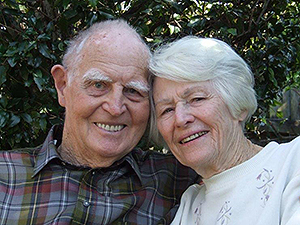
|
|
We also made close friends with Bill and Hock Goebel and their families and we often took other children to Hock and Betty Goebel's farm to show them where the milk came from, by milking the family cow. I used to light the boiler in the park every day so that we had hot showers and that left Hock and Bill free to work in the park. Memories of Girraween. I still possess my Honoury Ranger card. For your interest I am 91 years old.
Regards,
John and Iris
|
Interviewer: Vanessa Ryan
[The interview was conducted by telephone.]
Well John, thank you again for doing this interview. It's going to be good. So, when was the first time you visited Girraween?
It would have been Easter in 1973.
What made you go there?
A relative of ours had either been there or read about it. He'd been there, my wife just said. He used to work out at Hart's celery farm.
So he recommended it to you?
He recommended we should go there.
Right. So when you did go, you obviously liked it. Did you visit it very often?
Every time we either had Easter or Christmas, we went.
How long did you usually stay for?
The maximum of my holidays... If it was Christmas, I would have had the year - a couple of weeks holiday - so it would have been four weeks.
|
|
Wow, that's a fair stretch. That's good.
Yes.
So, what sort of things did you do while you were there?
Well, we had young children. They were at primary school... Eight up to twelve. They wanted to swim, climb rocks, walk. We climbed the Pyramid a couple of times. We went to Bald Rock as well. That was predominantly where we went.
Bill did a lot of photography and I was interested in photography. Bill was teaching me where to find the flowers, how to use close-ups, all the necessary parts of the fun of photography.
|
|
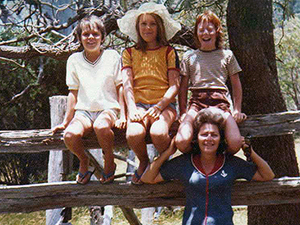
Iris with the kids at Girraween.
|
|
How did you come to meet Bill?
He was then working as a voluntary worker with his brother, Hock. They were working down the park... You know, repairing paths and collecting the rubbish - which we did in those days - and lighting the fire in the boiler for the hot water system. And our kids were really interested because, even though it was probably illegal, they used to go with them on the truck collecting rubbish. It was a ride on the trailer and lots of fun for kids. So that's what we did.
|
|
So, by doing that, is that how you got to be an Honorary Ranger in Girraween?
That would have been a contributing factor. Because I was interested in the flowers and learning from Bill and Hock - more from Bill, I guess - in many things. That would probably be unfair to Hock, because it was Hock that took us to the Aboriginal well, first and foremost. It was in the days when Paul was probably unaware there was an Aboriginal well there. He hadn't been there long enough to be told or shown or anything of that nature. So Hock was the one that took us there...
...Iris just mentioned the time when I had to challenge some people who were chucking bottles. That was another point, but that came afterwards, when I had my badge. I think I might have mentioned it to you. That was the only time I really used it, to do corrective services for the park in respect to damages and vandalism. But prior to that I didn't have a Ranger's authority or anything like that. Just really an interested spectator.
|
|
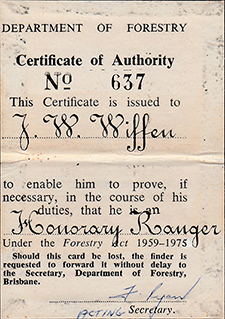
|
|
Could you relate that story again, about how you had to tell those people off? You've told me, but for the purposes of this interview.
We were down at the swimming hole and there were a few (clears throat) - I'd call them yobbos - obviously from Stanthorpe or thereabouts, drinking lots and lots of stubbies. Near the finish, when they were getting fairly intoxicated, one of them walked down to the waterhole where I was and tossed a stubby across, which immediately smashed on one of the rocks on the opposite side of the swimming hole. It was then that I suggested it would be a good idea if he went and got all the pieces of glass and brought them back and put them in the rubbish. He challenged me a bit on that and I said, well, you please yourself, but your car number has been taken and has been transmitted. If you want the police to meet you, we could. There's only two ways out (of the park) and if you choose to not get the glass, I said, then it will be just a matter of you will be going to the slammer for throwing things around. Breaking glass - that's a danger to people. That was really the only time I ever used it in that purpose. The rest of it was helping people find flowers and taking people on the various paths we could go on. That was all taught to me by the Goebel boys.
What sort of other things did you do as an Honorary Ranger?
|
|
I took a couple of people on occasions up to the Aboriginal well. We were determined to find it for ourselves because, Hock, not knowing very much about us apart from we were nice people, he'd always taken us there the roundabout way to confuse us... But we decided we should know how to get there by ourselves. Another chap and I, Ted Harper - we got a map and reckoned roughly how we could get to a certain point and from there on, we would have to use our own checking by one holding the fort and one wandering off in one direction and coming back. Eventually we found the well. After all that, we found that the well had been damaged by a falling tree. It was then that Paul became involved in all this stuff and he brought Hock - I don't think Bill came with us on that occasion. We all went up as a group carrying wire and stakes and posts to fence the Aboriginal well so that the wild pigs couldn't get into it and tear it to pieces.
|
|
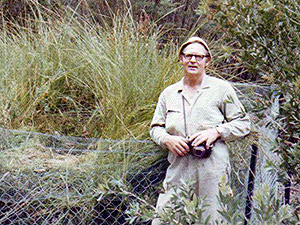
John at the fenced-off well.
|
|
You've mentioned Bill and Hock and Paul. Are there any other people that you worked with while you were there?
Not as far as the park. There was only the three of them working. There was Paul as a supervisor and then Hock and Bill and, for a little while, we had Peter (Peter Haselgrove). He went to Sundown eventually. Is it Sundown? I think it's Sundown. Near Tenterfield?
Yeah.
He was there some of the time.
So what would have been your biggest achievement while you were there?
Ah, learning a tremendous amount about nature. Where to find things in Queensland. I was a lover of wildflowers in Victoria - a completely different terrain. It was at one stage there with Bill, that I said to him, Bill, I've just gone down and I've found Greenhoods and a few things, why can't I find Spider Orchids? I said, it certainly looked like Spider Orchid country. And he said, where were you John? And I told him where I was and he said, oh, you've got to climb a little bit higher to get the Spider Orchids. He said, keep going where you are into the scrub and keep going upwards and on the next level, you'll find them. And sure enough, that's what we did and we found them...
It was one of those things, I guess, when you see people that are interested in nature and that, you can tell them where to find certain flowers. You would know yourself, that if anyone is really interested in something or if they're just talking. That's what we did.
|
| While you were there, did you experience any fires or floods or storms?
We did. We went out and fought fires on two nights, I guess. Way out there towards Mt Norman. All the guys and a few volunteers from the farms. There was John Thomas and I don't know, there might have been a couple of the Wren boys that came out. But we went out on the trucks - trying to put the fires out.
We also saw the big flood. I have shown you some of the photos of some of that. We were close enough to take photographs. I guess that's when the kids were photographed going down the Slides after a couple of days of the floods dying down a bit, so we could get down to the Junction.
Yeah, it certainly looked like there had been a bit of rain.
|
|
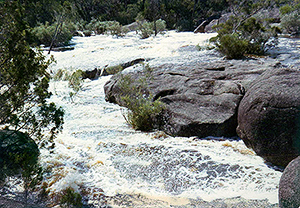
Bald Rock Creek in flood, 1976.
|
|
Oh, another thing that Hock taught me, was how to get worms in the Granite Belt where there's a lot of rocks and nowhere you can put a shovel in. He taught us that - he was a great friend indeed. At that stage, it was early in the piece before Paul had sort of settled into his job. He didn't want Paul to know about it, I guess. (Laughs.) It was a bit of fun. And he showed it to me and I was able to show it to one of my relatives when they came up to visit, how this happens. And it was quite an interesting little exercise.
Another time, Bill took us through to South Bald Rock and down inside the rock, which quite an experience in itself. It was quite a learning curve for me in many ways and the kids were certainly very interested in that sort of nature part of life. They still are.
So how do you catch worms in the Granite Belt?
|
|
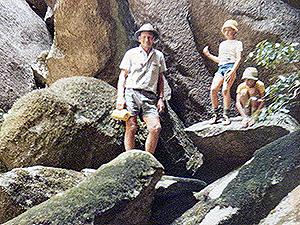
Bill and the kids at South Bald Rock.
|
|
Have you ever seen it done? Well, it's done by finding where there's a like a mini Ayers Rock sticking out of the ground. No more than about a foot off the ground. Then you get another rock and rub it on that rock, round and round and round and round. Apparently, it's the vibrations from the two rocks that disturbs the worms down underground and they come up to the surface. We were amazed. After rubbing for about ten minutes, there were worms everywhere.
Wow!
Hadn't you heard of that?
No, no...
Well, that's how it's done.
There you go. I've learned something.
Hock was always telling us about when they used to go fishing. And I said, well, what do you use for bait? And he said, oh, we use worms. I said, how the hell could you get worms out of this sort of country? I've never seen a worm here - there's no dirt or anywhere you can get them. And he said, I'll show you one day, John. He said, I'll wait 'til Paul's gone...
(Both laugh.)
He was smiling when he said it. But at that stage, Paul was not au fait with that fact either.
But he certainly learned it afterwards.
Sounds like Paul had a lot of learning to do, too.
Well, Paul was looked upon, actually not nastily, by anyone up there, but he was a newcomer from Head Office. And he came up with Head Office in the personality, if you wish. Whereas the Goebel boys had lived their life in the most as farmers. There was quite a vast difference in their personalities towards people and everything else. So we naturally took to Bill...
|
|
...Oh, Iris was just saying, we had many many happy hours with Paul and Leanne. Lovely people. We enjoyed them very much.
Quite often Bill would put a slide night on up in the garage next to the hut, the house, and some of the folks within the park would come up and watch it. I finished up buying Bill's original camera off him. It was a Pentax, with three tubes on it. Not like the modern day cameras. Each tube you screwed on brought you closer to the subject you were going to photograph. He used it mainly for taking closeups of flowers and stuff. Some of the photos I've given you of the Flying Duck Orchid was done with Bill's camera.
|
|
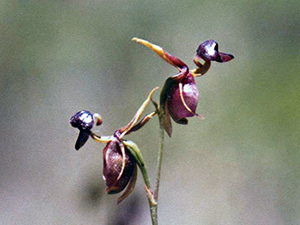
|
|
Did it ever snow while you were in Girraween?
No, we never had snow. We had some pretty cold, frosty mornings, but that was only at Easter.
Yeah?
The people that took us there that Easter... We were fortunate we had that caravan - which is in the photos I showed you - they came up in a tent. These are the people who introduced us to Girraween. It was at Easter and there were so many people there that it was packed out in the camping areas. It must have been Paul who said to park in the picnic area. Which we did, up near the roadway. It was so cold and frosty that night, that the people in the tent came in the caravan to keep warm. That's the only time that we ever struck it with snow or sleet. It had snowed on the ring road between Ballandean and Stanthorpe a couple of times while we were there, but it never ever fell at Girraween while that was happening.
You mentioned that you were interested in wildflowers. What sort of wildflowers? Are there any particular kinds you like, like orchids or..?
Orchids, more particularly orchids. When I couldn't find one, I would ask Paul or Bill where I might I find them. And they were always able to tell me, have I got one of those? No, I haven't. Well, if you go to such and such, you'll find orchids. Little things like that.
Right.
And I was then able to transmit that to others that were interested within the park. It made a big difference. And they understood to teach the kids not to pick them. That was a big problem in the earliest days. The kids come in, see pretty flowers... They used to drag them out by the roots and everything...just to take them in to mum and dad.
Oh no!
We stopped that.
|
|
Another other good experience we had there... It must have been about December 15 or something one year, probably '74 or '75 - when we had a tape from old Bill on the Lyrebirds that he'd done. We were playing it in the caravan. An English family arrived and this chappie with all the knowledge - he reckoned he knew everything - he'd park right next to us for some reason. And he got out there with his kids trying to find the birds in the trees - the Lyrebird that was performing. It created great mirth in our family to watch them. He was looking up, trying to find out what the birds were and where they were. But it was coming out of the caravan!
(Laughs.) Oh dear...
It was good fun.
|
|
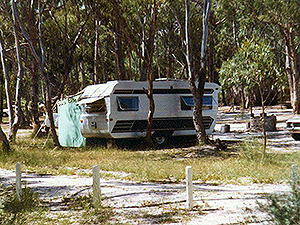
The Wiffen family's caravan - "The Princess".
|
|
Oh yeah... So what do you like most about Girraween?
Solitude, to start with. The solitude that you can have for yourself and the beauty of the place, I might add. It's so beautifully peaceful. I guess there's nowhere up there that you can't go to get a bit of solitude, if that's what you want. As you get a little older, the more solitude you require - you desire, rather than require. And you could always get that at Girraween, because no matter where you went you could always find some place where there wasn't anyone. We used to love it for that reason. Of course it's changed a bit now...there's more people and you've got more technology around you with people using things that never were available in our days. So, it's the solitude I guess. The quiet nights you could sit around and talk and not have someone with a radio blaring at you three campsites away. Which I guess, would happen today, well I guess in most places... Now I'm too old for a camp bed, so it's motels for me.
I'm a bit the same. So, you came up for the 50th anniversary. Did you get much of a chance to look around at the place?
Well, I did. I walked as far as I possibly could, because I'm limited to just how far I can walk without stopping. My kids are very strong and good to me. They carted me here, there and everywhere. I did enjoy looking around at what I could see. I had a tour of the park and through the accommodation areas and I just had a look. I think the last time we went to Girraween we were in the top camping area. They'd closed the bottom camping area and they had... I think it was... gas heated water for showers.
Back in the days we used to go there a lot with our children, I used to give the boys a hand by lighting the boiler in the afternoons so that we got hot water for the campers for showers. I was a nasty old man some of the times, because the kids would come down as soon as they'd see the smoke coming out the stack and I'd still be stoking it, trying to get the water up to temperature. They'd be in there using the hot water as fast as I was making it, so I used to turn the hot water tap off for a little bit. It was the only way you could get the kids out of the shower and leave some of the water for the adults. Other than that, I did enjoy doing it very much.
I also used to go help start the pump. It was pretty hard yakka, I can tell you. I was reasonably strong about it, but not quite as good as Hock Goebel. Periodically, I'd have a look and I'd talk to Hock and he'd say, we need some water John. I'd say, I'll go and do it for you Hock. He'd be doing something else around the park, mind you. So I did a lot of work voluntarily, myself, as well as enjoying every bit of helping the boys.
|
|
What is your fondest memory of your visits to Girraween?
Oh, there are so many. It's very difficult to believe (how many) fond memories.
Well, I guess the fondest memories I could have are of my kids having a slide down at the Junction just after the flood had gone. They all could swim and they were on the Slide and there was a lot of water going down and they were having a ball. That's one of my fondest memories of Girraween.
I might add that when John Thomas had his orchard going, we used to go give John a hand - picking the apples.
|
|
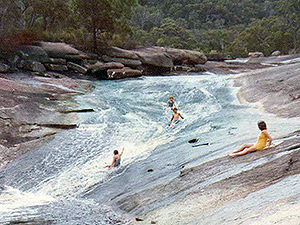
|
|
And we spent a lot of time with the Wrens, up in the packing shed and going out into the orchard itself and picking because it just was a delight. All the beautiful fruit that we'd consider as being ready for eating, they'd throw on the ground because it was too far gone to go to market. So we used to go and eat all the good stuff and they'd pick the half ripe stuff for the market.
Yeah. I suppose it would take time for it to ripen and get to Brisbane.
Well, that's their attitude, but my attitude - if you can see a beautiful, ripe peach on the tree, then that's when you eat it. It's a matter of how you look at it.
Yeah, don't waste it.
Their job was commercial and mine was pleasure.
|
|
Right. When you were looking around, when you were up there last, what do you think were the biggest changes that you saw?
Well, the growth actually... The thing that's changed so dramatically, beyond belief almost, is the tree size. It certainly has grown in the upper camping area. Because, when we used to go there, it was just in the open. We were there when it first became open and, of course, all the trees were little tiny things. It was hot and nobody wanted to go there, but the bottom one was closed so we had to go to the top one. When we drove through this last time, there was so much growth on the trees it was beautiful. Just beautiful.
|
|
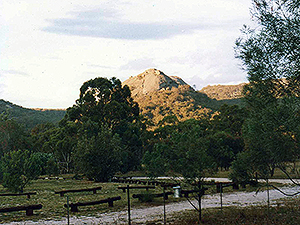
|
|
I've seen a lot of old photos of when the trees were still babies. I just don't recognise the place.
Oh, it's changed dramatically over the years. I guess some of the walks would still be the same...
|
|
I have always remembered, because as you are probably well aware from my comments, Hock was quite a funny man. The first time he took us up - I think it might have been when we were going up taking the wire up to put around the Aboriginal well - he took us the short cut. Which wasn't a short cut really, I don't think. I think he led us along. At every ants' nest we came to, because he was leading, he'd give it a good stamping first. So that by the time we all came through, the ants were all agitated and having a go at us.
Oh, that's a bit mean! (Laughs.)
(Chuckles.) He thought it was fun.
Oh dear...
Well, he was a villain, Hock. He was a villain.
|
|
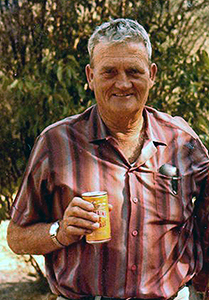
Hock Goebel.
|
|
Do you have any other interesting stories?
You'd get a lot of city kids coming up there camping... Never camped in their life before. We used to go out to where Hock was living - just out to the farm - and I'd take the kids out with me and we'd try to milk the cow for them. I could milk - I used to keep goats - so I was quite competent as far as milking was concerned, but it was for the city kids... To show them where the milk was coming from. Most of them thought it came out of bottles. You know, that's all they ever knew. They'd never been to a farm, never seen a cow being milked. That was another quite educational little area for us. We used to go around to Hock, with his farm and with his picking vegetables and so forth for market.
I was just wondering if Iris has any memories that she'd like to share with us as well?
I'll put her on for you...
Iris: Good afternoon, Vanessa.
Hello Iris.
I'm sorry I didn't get around to saying goodbye to you, I don't think, when we left up there. (Girraween's 50th anniversary celebration.)
It was kind of a bit of a rushed ending to the day. Everyone was scattering...
I said to John, when we got home, I've got to write to someone so that the right people get thanked. The women that got all that lantern parade together for the children. The work that went into them was unbelievable.
|
|
Yeah, I was looking at the lanterns. The kids had done a really good job on them.
Did the children do that?
Yeah. Apparently. I think it was a school project - they did it through their school.
It was just wonderful!
Yeah, I have to agree. It was very, very nice.
We were disappointed that we didn't see it all, but then our ages, you know. John's lucky to still be here at this age.
Well, I followed them around and it was lovely seeing them standing on the creek bank...
Yes?
|
|
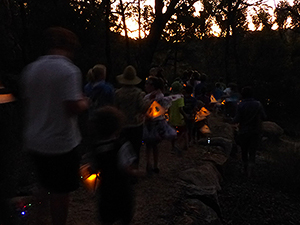
The lantern parade.
|
|
...and casting their wishes out over the water and waving their lanterns around. It was really nice.
It was lovely. We thought we'd see more of the people that we came across on holidays, but we didn't come across anyone we knew, apart from Leanne and Paul. And I always enjoyed Leanne's company. She was always extremely helpful.
|
|
I was going to ask - I've heard John's stories of Girraween - have you got any that you'd like to share?
Look, they were some of the most, the best, holidays of our life. The children, I was always worried about them falling off rocks and drowning. John used to take the children to deep holes to learn to swim, because I don't swim and I was frightened all the time.
I used to sit there in this peaceful world all on my own, washing the clothes and putting them on the rocks. And I'd say, they're ironed now, because the rocks would be so hot!
(Both laugh.)
|
|
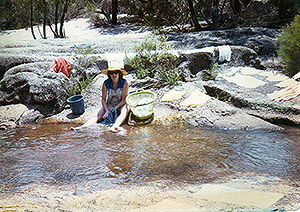
|
|
You know, I loved the walks. I loved the company and just the whole social bit of it. One year we went up there - I think it might have been the first Christmas we went up there - and for the first night we were the only people there for twenty four hours. Oh look, it was the most wonderful feeling.
Wow, that was at Christmas time?
It was more Christmas holidays. We would have set off the minute school had finished. It wouldn't have been right on Christmas, it would have been before people started moving in straight away. But we had that one night there alone. And I'm going (sighs) how wonderful this is.
John said he's interested in wildflowers. Are you interested in wildflowers as well?
Oh, I just love flowers of any sort. But my favourite one up there... One year the Flannel Flowers were unbelievably beautiful. All through the rocks, you know, all the grey rocks with these lovely white flowers on them.
Yeah...
I love the Flannel Flowers.
There's still a lovely patch of them on the way down to the Junction.
That's mainly where we'd see them. But one year, they were so thick.
Oh, that would have been beautiful. So you were saying about the social life... What sort of things did you do?
Well, everybody ate breakfast out in the open and chatted and shared bits and pieces of things. The women even used to go to the farms and get fruit and then they'd come back and make jam on the campfires!
Good grief!
They actually bottled jam out there. I think Shirley Harper was one of them. I can't remember a lot of them.
That's fine. But gee, my Mum used to make jam. I know what a business that is.
Well, they'd go down to Stanthorpe and buy all these sugars and scrounge bottles from everywhere. When you're out like that, people have always got bottles that they'd emptied because they'd taken tinned and bottled stuff.
|
|
But also, I'll tell you what, in my early days out there, because I'd never really experienced possums like they were... Oh, what a horrible noise at night time!
Yeah, when it's that time of year, they can get noisy.
Yes, yes!
So, do you have any other... Well, what's your fondest memory? I asked John that. What's your fondest memory of Girraween?
Climbing the Pyramid. You know, when I got there I was too frightened to stand up upright. I crawled all the way. (Laughs...)
Oh look, there were lots. You know, one night, all the men dug a pit and we all went and bought legs of lamb and hung them over the pit. And just exploring... Looking for flowers... Underground River, I loved as well.
You like that too, yeah?
We've got one great snap of one of our kids and another one of my friends right down in it. Just with a ray of light going through... Yeah... Too many fond memories.
Well, look, thank you very much Iris. I was just wondering, can I speak to John again before I go?
You certainly may. And all the best to you, my love, and stay well.
Oh thank you. You too!
Enjoy, bye bye...
John: Back again...
|
|
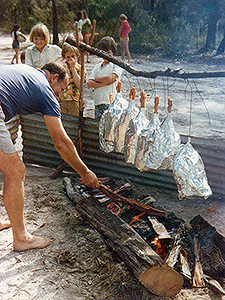
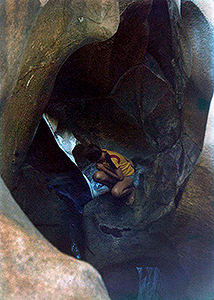
|
|
Hi again John. I was just going to say thank you very much for this interview. It's been fantastic.
I'm glad if you can use any of it. It's good fun if it helps people appreciate the country that we love.
I've been interviewing the rangers and I hope to interview some scientists, you know, botanists who have been in Girraween. But you've got such a unique perspective as being a visitor and an Honorary Ranger. It's been a sheer delight listening to your stories.
Thank you.
More of John's Girraween Photos...
|
|

